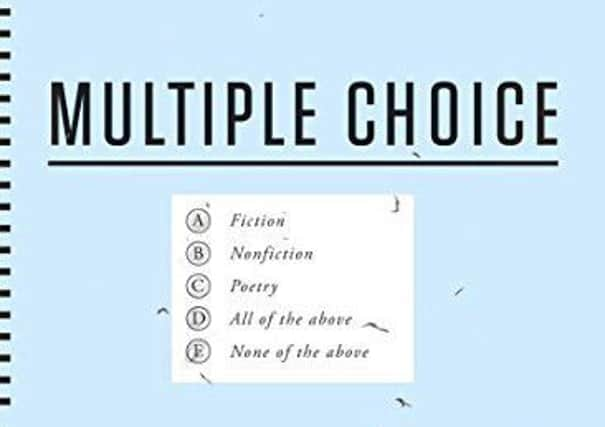Book review: Multiple Choice, by Alejandro Zambra


The book is divided into five sections. In the first, “Excluded Term”, we are invited to “mark the answer that corresponds to the word whose meaning has no relation to either the heading or the other words listed.” In some cases the answer is entertainingly obvious on one level, but also slightly sinister on another – for example, “Bear: a) endure; b) tolerate, c) abide; d) panda; e) kangaroo”. The answer, of course, is kangaroo, but more to the point, who or what is having to endure or tolerate something? And why does the next question offer “preach,” “control” and “initiate” as words that could all correspond to the word “teach”? By the time you get to question 23 in this section – “Silence: a) fidelity, b) complicity, c) loyalty, d) conspiracy, e) cowardice” – you will have realised that there is something much more sophisticated going on than simply having fun with an official exam.
In section two, “Sentence Order”, we are offered a series of sentences and invited to “mark the answer that puts the sentences in the best order to form a coherent text.” Here, the questions seem to be arranged in such a way that they tell the story of a life in miniature, from earliest memories to life-threatening illness. If you wanted, you could simply read the sentences in the order they are presented. By mixing up the sentence order in the various ways suggested, however, you come to realise there aren’t any right answers – just lots of subtly different ways of conveying the same information.
Advertisement
Hide AdIn the third section, “Sentence Completion”, we’re back – to begin with, at least – in the world of comedy one-liners. Question 37: “______ the thousand amendments they’ve made to it, the Chilean Constitution of 1980 is a piece of shit.” Is the missing text a) after, b) due to, c) in spite of, d) thanks to or e) notwithstanding.” However the section ends with questions relating to what is evidently a deeply dysfunctional father/son relationship; there is comedy here, too, but also an overwhelming sense of regret.
In Section Four, “Sentence Elimination”, we are presented with strings of sentences and invited to pick the ones that can be removed “because they either do not add information or are unrelated to the rest of the text”. This is where things get really interesting, because in a sense Zambra is putting us inside the head of the working novelist, forcing us to decide which bits of information are pertinent and which are not.
Finally, in Section Five, “Reading Comprehension”, we are given three short texts to answer questions on – one about the art of cheating in exams (geddit?), one about a marriage gone sour, and one that reads like a deathbed letter from a father to a son. Zambra is evidently having a metatextual blast in this final section, and readers will too, as he gleefully picks apart the mechanics of his own writing. The only real problem with this unusually pleasurable exam is that it’s over far too quickly.
Multiple Choice by Alejandro Zambra, Granta, 102pp, £12